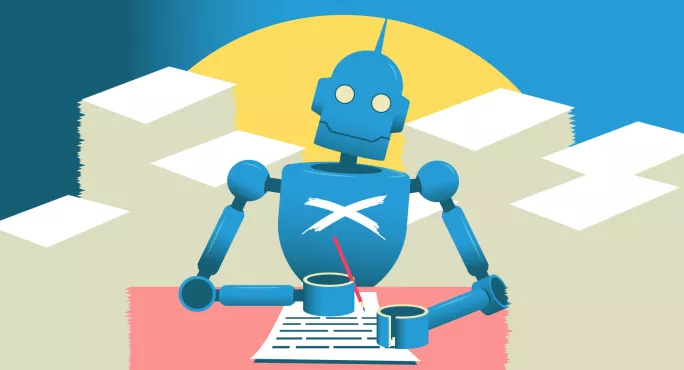Half of educators use AI for teaching, finds SQA survey

Artificial intelligence (AI) such as ChatGPT is being used for teaching by half of the educators who took part in a Scottish Qualifications Authority (SQA) survey.
The SQA has published new research showing the impact generative artificial intelligence (GenAI) is having on education in Scotland.
‘Human-like’ AI increases plagiarism risk
The qualifications and assessment body describes GenAI as any type of AI that is used to create text, prose, formulae, code, images, video or audio, including ChatGPT and Google Bard.
“AI outputs can be very human-like, potentially increasing the risk of plagiarism,” the SQA says.
Over 500 educators from across Scotland - including classroom teachers, lecturers, senior managers and school leaders - took part in the survey.
Key findings include:
- Half of respondents have used GenAI to support their teaching work, with the most common uses including material and activity design (77 per cent), lesson planning (52 per cent), general administration (47 per cent), designing assessments (39 per cent) and instruction/lesson delivery (35 per cent)
- Almost eight out of 10 educators surveyed believe that learners should be taught how to use GenAI tools responsibly and ethically
- Nearly half of those surveyed raised concerns that the misuse of AI tools poses a risk to the integrity of assessments
- Many educators have interpreted the SQA’s position on artificial intelligence as an all-out ban on AI use by students, although opinion varies on whether this is positive or negative
- Related: How AI’s power can be harnessed by primary schools
- Long read: What’s happening with mobile phones in Scottish schools?
- Staffing: ‘We have computing science deserts in Scotland’
There was strong support for the SQA’s position on the use of GenAI in assessments: 63 per cent of teachers surveyed agree with the SQA’s 2023-24 position that students must not submit GenAI outputs as their own work, nor can they refer to GenAI outputs as a source for assessment tasks.
Teachers want more help to keep pace with GenAI
A consistent message from educators was that they wanted more guidance from SQA and other education bodies to help keep pace with the rapid growth of GenAI technology.
When asked what needed to be addressed most urgently for GenAI to be suitable for widespread use in Scottish education, the top three choices were: the ability to detect AI-produced content (68 per cent); personal lack of understanding or knowledge (62 per cent); and lack of guidance from within the education system (53 per cent).
Martyn Ware, the SQA’s director of policy, analysis and standards, said: “This is the first time that a wide range of educators from across Scotland have been asked about their views towards GenAI.”
He added: “We have evidence now that many teachers and lecturers are harnessing AI to reduce the burden of administration and allow them to focus on what they do best - supporting and inspiring our young people in the classroom.
“But it is also clear that they share our view of the critical importance of safeguards and clear guidelines to ensure the ethical and appropriate use and understanding of GenAI technologies.”
SQA’s position on GenAI is unchanged for 2024-25
The SQA is today also confirming that its position on candidates’ use of GenAI in assessments will remain in place for 2024-25.
It states: “The use of Generative AI tools and outputs will not be permitted to generate outputs that could then be submitted as the learner’s own work when completing assessment tasks that contribute towards a qualification. Doing so could constitute malpractice.”
It adds: “The SQA continues to discourage the use of referencing GenAI outputs. While this will not be regarded as malpractice, outputs from GenAI are still unreliable and still cannot be regarded as a reliable source of information.”
However, GenAI is not completely outlawed.
The SQA says it “does not object to learners or practitioners using GenAI technologies to help them generate ideas or investigate issues”.
It adds that “this should be done in conjunction with teachers and lecturers and should be in line with the requirements for individual subjects, centres’ own policies, and comply with the age restrictions some GenAI technologies have introduced”.
Mr Ware said: “Our stance continues to reflect similar positions from assessment specialists and other awarding bodies from across the UK.”
He added: “We will work with our partners across Scottish education, supporting teachers and lecturers where we can, listening to their views and sharing their insights so we can work effectively together to protect the credibility of assessments and qualifications.”
For the latest Scottish education news, analysis and features delivered directly to your inbox, sign up to Tes magazine’s The Week in Scotland newsletter
Register with Tes and you can read two free articles every month plus you'll have access to our range of award-winning newsletters.
Keep reading with our special offer!
You’ve reached your limit of free articles this month.
- Unlimited access to all Tes magazine content
- Save your favourite articles and gift them to your colleagues
- Exclusive subscriber-only stories
- Over 200,000 archived articles
- Unlimited access to all Tes magazine content
- Save your favourite articles and gift them to your colleagues
- Exclusive subscriber-only stories
- Over 200,000 archived articles



